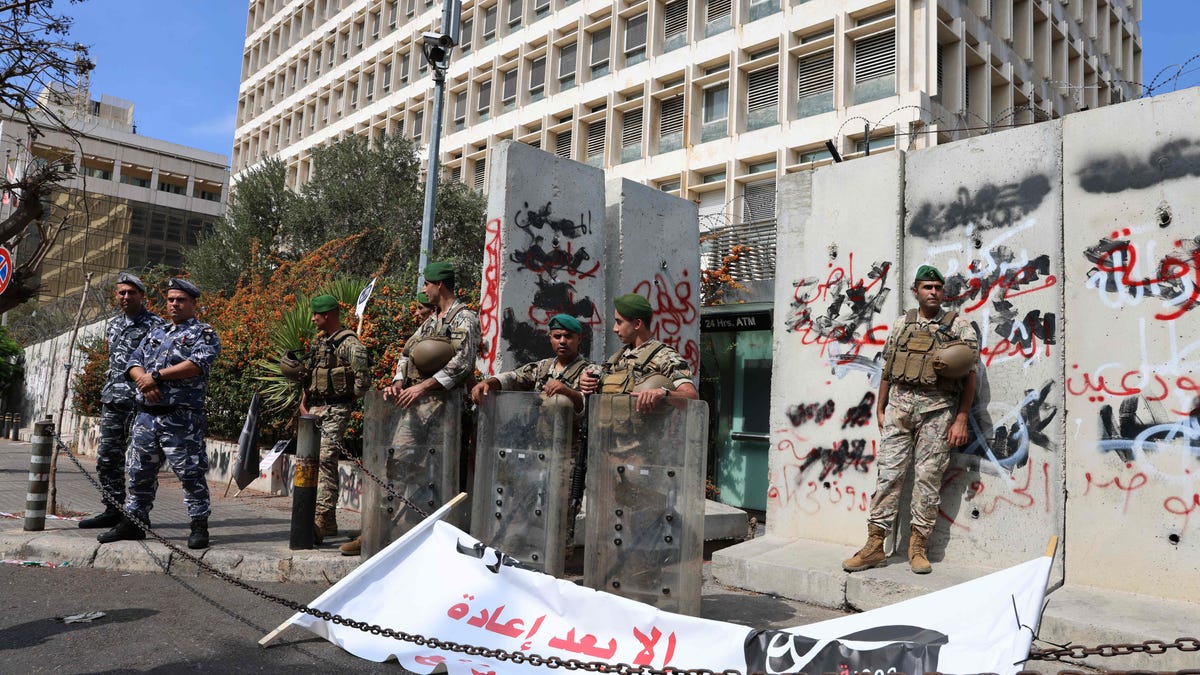On Dec. 17, experiences element that residents in Lebanon have been staging sit-ins and protests at banks with a purpose to entry their very own financial savings accounts. Because the financial collapse in 2019, Lebanon’s banks froze Lebanese financial institution accounts, and numerous branches have remained closed indefinitely. The deprivation of wealth has triggered just a few impoverished Lebanese to demand their financial savings at gunpoint however to date, even these techniques have left most residents strolling away or arrested penniless.
Lebanon’s Banks Deal With Protests and Gunpoint Calls for From Folks Who Need Their Financial savings Again
In August 2019, it turned obvious to the world that Lebanon was affected by a liquidity disaster, and there have been many experiences that say monetary coverups and U.S. sanctions put Lebanon’s economic system in a vice grip. It has been reported that by late 2018, a handful of Lebanese industrial banks froze individuals’s accounts and by the primary week of March 2020, Lebanon stated it will default on its Eurobond debt.
The nation began in search of out restructuring agreements, and Lebanon’s lira alternate charge diverged considerably from the black market charge. A report printed in August 2022 particulars that the “black market charge is what the foreign money is definitely price now.” In June 2022, Bitcoin.com Information reported on Lebanon’s inflation charge surging to 211% which highlighted the economist Steve Hanke, who stated the nation ought to leverage a foreign money board.

On Dec. 17, NPR columnist Ruth Sherlock described how poverty-stricken Lebanese have been outdoors of banks protesting with a purpose to get entry to their very own financial savings accounts. In Tripoli, Lebanon at an IBL Financial institution department, Sherlock stated a 53-year-old girl named Zahra Khaled sat in a wheelchair and wouldn’t depart the financial institution till the workers gave up her life financial savings. Khaled commented that the financial institution froze “tens of 1000’s of {dollars},” Sherlock says in her report.
Sherlock additional particulars that Khaled’s protest is “one of many milder techniques” and a few are utilizing both actual or toy weapons to get their a reimbursement. The NPR reporter does observe that some Lebanese who resort to this tactic solely need “what they’re owed.” Numerous experiences, littered all around the web, verify Sherlock’s account that claims Lebanese financial institution accounts have been frozen since 2019, because the onset of Lebanon’s financial collapse. In 2020, offended depositors and protests received so dangerous that the industrial banks armored the fronts of particular department buildings with steel and cement walls.
Reuters reported in Sept. 2022 that “financial institution holdups snowball in Lebanon as depositors demand their very own cash,” as a lot of these acts have turn into a standard prevalence within the nation. Reuters elaborated that 5 depositors held up banks with a purpose to entry their very own funds and a few depositors managed to get round $60K, whereas some individuals have been taken into custody. In Nov. 2022, Al Jazeera detailed that banks in Lebanon reopened for 2 weeks. “I’ve been ready to money a cheque for greater than two weeks,” a Lebanese photographer instructed Al Jazeera.
Sherlock’s report specified that Khaled negotiated with the financial institution’s workers for hours however ultimately the workers left and Lebanese police often known as the Inside Safety Forces (ISF) escorted Khaled out, with none of her funds. Lebanese depositors have had points and have held protests at banks like Financial institution Audi, IBL Financial institution, Blom Financial institution, BLC Financial institution, Financial institution of Beirut, Fransabank, and Byblos Financial institution. On Dec. 16, Reuters reported {that a} U.S. court docket of appeals has determined that Lebanese industrial banks may be tried outdoors Lebanon.
Tags on this story
What do you consider Sherlock’s report that claims Lebanese residents are resorting to attempting to get their funds at gunpoint and assembling protests in entrance of Lebanon’s industrial banks? Tell us what you consider this topic within the feedback part under.
Jamie Redman
Jamie Redman is the Information Lead at Bitcoin.com Information and a monetary tech journalist residing in Florida. Redman has been an energetic member of the cryptocurrency group since 2011. He has a ardour for Bitcoin, open-source code, and decentralized purposes. Since September 2015, Redman has written greater than 6,000 articles for Bitcoin.com Information concerning the disruptive protocols rising right now.
Picture Credit: Shutterstock, Pixabay, Wiki Commons
Disclaimer: This text is for informational functions solely. It isn’t a direct supply or solicitation of a proposal to purchase or promote, or a advice or endorsement of any merchandise, providers, or firms. Bitcoin.com doesn’t present funding, tax, authorized, or accounting recommendation. Neither the corporate nor the writer is accountable, straight or not directly, for any harm or loss triggered or alleged to be brought on by or in reference to the usage of or reliance on any content material, items or providers talked about on this article.
